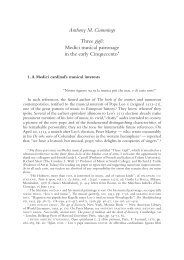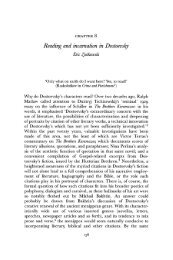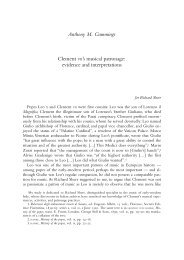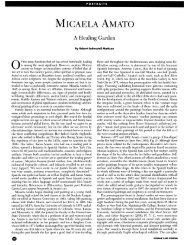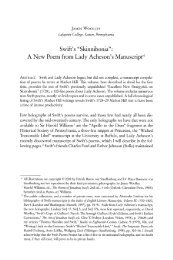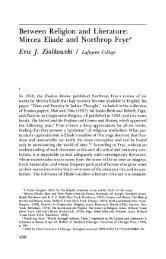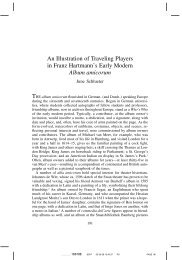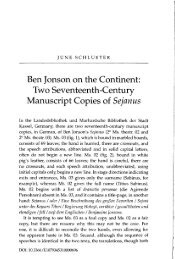courses of instruction - Lafayette College
courses of instruction - Lafayette College
courses of instruction - Lafayette College
You also want an ePaper? Increase the reach of your titles
YUMPU automatically turns print PDFs into web optimized ePapers that Google loves.
scholarships are awarded to outstanding<br />
performers.<br />
ADVANCED ROTC SUMMER CAMP<br />
Formally enrolled students in pursuit <strong>of</strong> a<br />
commission must successfully complete a<br />
five-week training program normally con<br />
ducted at Fort Lewis, Washington, be<br />
tween their junior and senior year. Focus<br />
is on evaluation <strong>of</strong> military leadership<br />
skills over a broad spectrum <strong>of</strong> training<br />
events. Students are paid for travel and<br />
attendance. Prerequisites are completion<br />
<strong>of</strong> the basic military science <strong>courses</strong> or<br />
their equivalent and MS 301 and 302.<br />
ADDITIONAL TRAINING<br />
OPPORTUNITIES AND ACTIVITIES<br />
Volunteer activities include: U.S. Army Air<br />
borne School, U.S. Army Air Assault School,<br />
Ranger Club (study <strong>of</strong> small unit tactical op<br />
erations), orienteering, formal military social<br />
affairs, rappelling, Marquis Guard (color<br />
guard), and trips to various military installa<br />
tions and historical battlefields.<br />
MUSIC<br />
Pr<strong>of</strong>essor Stockton (Head); Associate Pr<strong>of</strong>essor<br />
Melin; Assistant Pr<strong>of</strong>essor Dobbins<br />
The Music Department <strong>of</strong>fers students from<br />
all disciplines opportunities to develop an<br />
understanding and appreciation <strong>of</strong> music<br />
through a wide range <strong>of</strong> <strong>courses</strong> and perfor<br />
mance activities. Students may elect to pur<br />
sue a major or minor in music, or to partici<br />
pate at whatever level their background and<br />
interest dictates. Faculty members are active<br />
performers and scholars who take a special<br />
interest in personalized <strong>instruction</strong>.<br />
The curriculum includes <strong>of</strong>ferings in<br />
theory, composition, performance, history,<br />
and literature. In addition to the more con<br />
ventional areas <strong>of</strong> music study, the depart<br />
ment <strong>of</strong>fers opportunities to study world<br />
music traditions, jazz and popular styles,<br />
and electronic music. The Williams Center<br />
for the Arts includes rehearsal and practice<br />
facilities, an electronic music studio, a score<br />
and multimedia library, concert hall, and<br />
MUSIC<br />
computer <strong>instruction</strong> facilities. Students<br />
have opportunities to perform in choral<br />
groups as well as jazz, brass, string, wind,<br />
and percussion ensembles. The artist-in-res-<br />
idence program brings noted artists from all<br />
over the world to interact with students<br />
through workshops and classes.<br />
Requirements for the major: Music 101,<br />
102,103,221,222,491 or 495, eight semesters<br />
<strong>of</strong> Applied Music (Music 141,142,150), two<br />
additional Music <strong>courses</strong>, and demonstrated<br />
piano pr<strong>of</strong>iciency (by examination or two<br />
semesters <strong>of</strong> piano study [Music 141] with<br />
grades <strong>of</strong> B or better).<br />
Requirements for the minor: Music 101,<br />
102,221, four semesters <strong>of</strong> Applied Music<br />
(Music 141,142,150), one additional Music<br />
course, and demonstrated piano pr<strong>of</strong>iciency<br />
(by examination or two semesters <strong>of</strong> piano<br />
study [Music 141] with grades <strong>of</strong> B or better).<br />
101. Basic Musicianship. An introduction<br />
to music, emphasizing the development <strong>of</strong><br />
practical musical skills in addition to an<br />
understanding <strong>of</strong> elementary music theory<br />
skills (such as ear-training, sight-singing),<br />
basic performance techniques, and composi<br />
tion. Theoretical topics include: scales, inter<br />
vals, chords, and rhythmic organization. A<br />
wide range <strong>of</strong> musical styles is incorporated.<br />
In addition to developing perceptive listening<br />
skills, students participate in analysis, per<br />
formance, and composition. No previous<br />
experience required. Lecture/laboratory/<br />
listening. Offered each semester. S taff<br />
102. Music in Western Civilization. The fo<br />
cus <strong>of</strong> this course is the development <strong>of</strong> mu<br />
sic in the civilizations <strong>of</strong> Europe and Ameri<br />
ca, not only as an art with its own history,<br />
but also as a mirror <strong>of</strong> the artistic, social, po<br />
litical, and economic development <strong>of</strong> the<br />
Western world. Students are introduced to a<br />
basic repertoire in classical music. Lecture/<br />
listening. Offered each semester. Mr. Melin<br />
103. Introduction to World Music Tradi<br />
tions. An exploration <strong>of</strong> the history, styles,<br />
and performance practices <strong>of</strong> music <strong>of</strong> Afri<br />
can, Asian, and Indian cultures. The study <strong>of</strong><br />
the music in the context <strong>of</strong> cultural traditions<br />
and institutions and its influence on the mu-<br />
149




